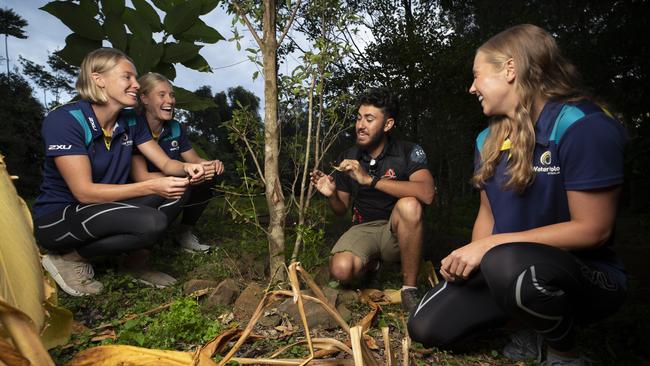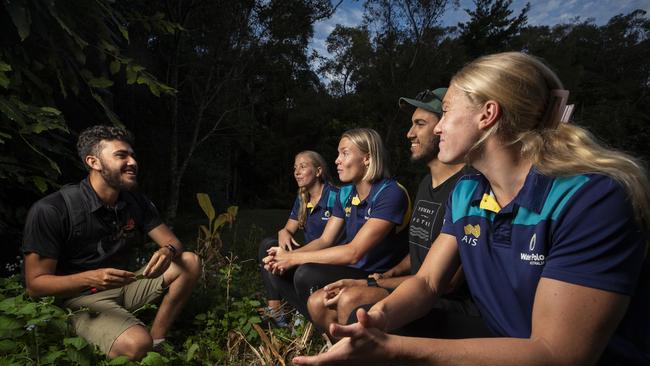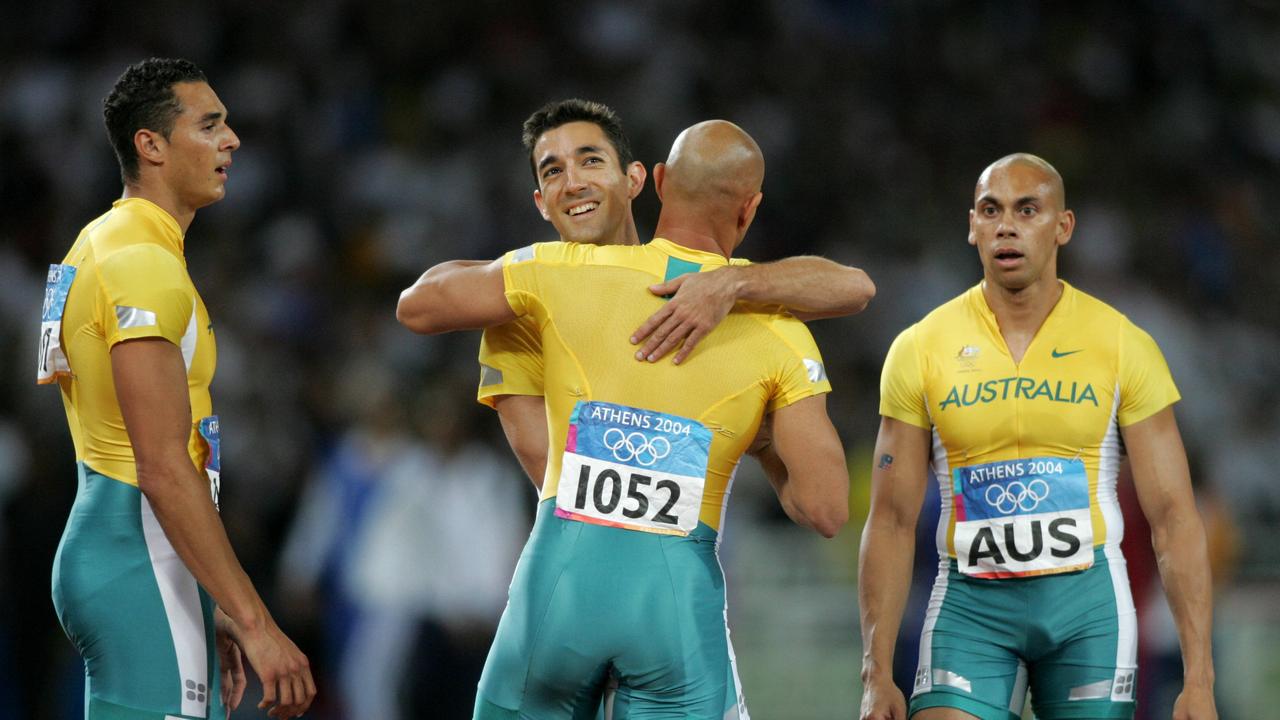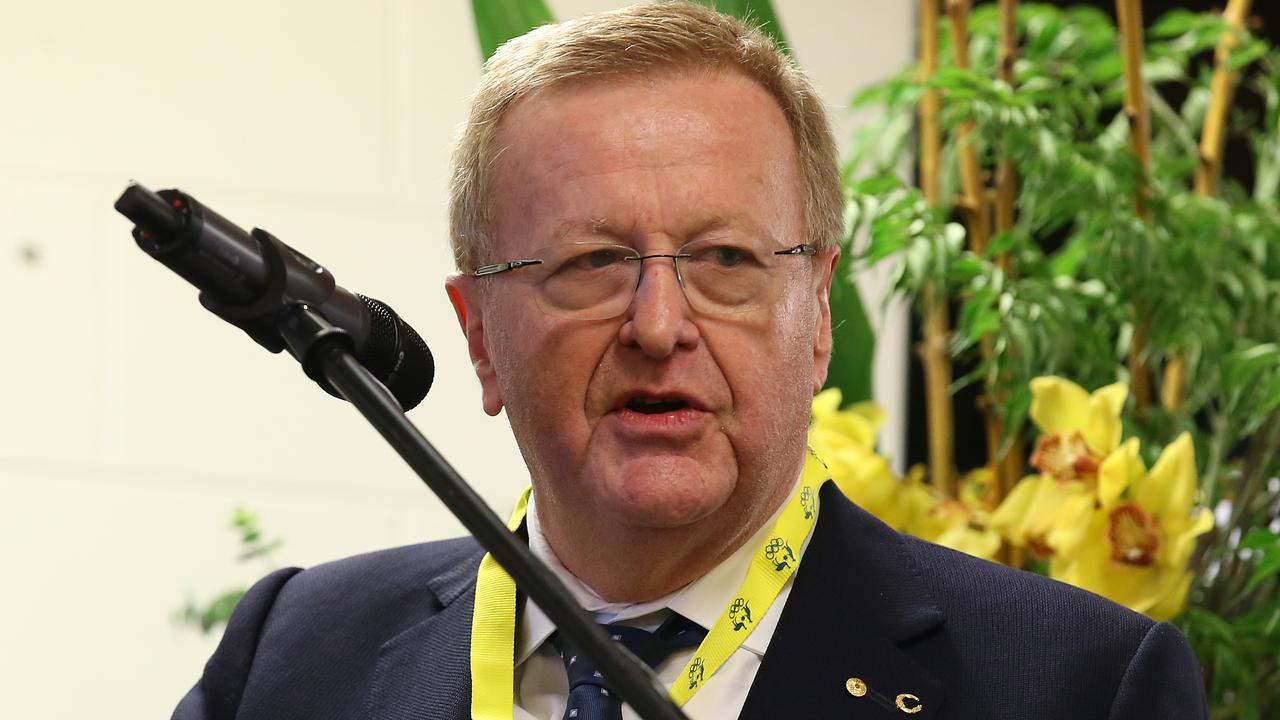Indigenous Sport Month: Olympic water polo team determined to represent Australia’s Indigenous heritage
In search of their true colours, the Aussie Women’s water polo team has gone bush in a bid to represent Australia’s rich Indigenous heritage on the world stage.
Olympics
Don't miss out on the headlines from Olympics. Followed categories will be added to My News.
In search of their true colours, the Aussie Women’s water polo team have gone bush.
Instigated by Amy Ridge, the Stingers are determined to represent all of Australia - including First Nations people - when they take the water at the Olympics next month.
As a squad, the Stingers visited TribalLink on the Sunshine Coast in Queensland this week to participate and learn about Indigenous concepts, bush skills and bush tucker.
Ridge, 24, said: “We are representing Australia on the world stage in Japan and it’s important to us to be able to proudly represent all Australians.

“To know what this means, to be Australian, we wanted to connect with our culture and learn more about connection to country.
“I think we are the one of the first Olympic teams to do something like this ... as a squad we want to leave a legacy for the Australian Water Polo community.
“And also absorb this on a personal level.”
Ridge is also an ambassador for the Australian Institute of Sport’s Share A Yarn program.
As part of the program, First Nations and non-Indigenous athletes undertake cultural training to foster reconciliation and improve cultural competency within their own sports.
“I have been studying law for seven years, part-time, and it is really obvious to me the disadvantages suffered by Indigenous people in the criminal justice system,” Ridge said.

“It’s through law that I became acutely aware of some of the issues indigenous Australians experience.
“We have to break the barriers and have the uncomfortable conversations so we better understand.
“With learning and understanding we can improve things.”
In recent years, the men’s team has included Indigenous players Nathan Thomas (Sydney 2000, Athens 2004), Dean Semmens (Athens 2004) and Joel Swift in Rio 2016.
The women’s program has had no known Indigenous Olympians.
“There are high barriers for entry to play water polo,” she said.
“Facilities, the cost ... it is such a great sport but we know there is work to be done in providing greater opportunity to play polo.
“It goes beyond but includes Indigenous Australians and ... and we would all love the sport to expand and be more inclusive.”
The Stingers start their Olympic campaign against Canada on Saturday July 24 where they are expected to make the medal round.
The Stingers won bronze at the 2019 World Championships in Gwangju Korea, and won Olympic bronze at London 2012 and Beijing 2008.
Head coach Predrag Mihailovic said: “e have a very good culture with individuals having their own goals and team goals.”
“We are on the right track as a united group, we are getting comfortable in uncomfortable situations.”
AOC launches Reconciliation Action Plan
The Australian Olympic Committee has launched their inaugural Reconciliation Action Plan (RAP) in a move indigenous leader Patrick Johnson has hailed groundbreaking for the international sporting community.
Johnson, a dual Olympian, proud Kaanju man and chair of the Indigenous Advisory Committee – which also includes the likes of Nova Peris and Kyle Vanderkuyp – said the special milestone follows the recent amendment of the AOC’s constitution to ensure there is a permanent voice on the AOC’s Athletes’ Commission.
“The AOC has now endorsed and backed and is really behind the whole RAP process ... this is the start of incredible opportunities not just for indigenous people but for Australia and collectively the world,” Johnson, Australia’s 100m record holder, said.
“Because we are leading the space when it talks about engaging, acknowledging, recognising, and celebrating First Nations People.

“We’re a nation that loves our sport and sport has that ability to bring together people from all nationalities, religions and divides.
“I think this is one of the unique opportunities within the Olympic movement.
“Australia is now leading the process around the world. Recognition, acknowledgment and reconciliation are big words and to have meaning, they need action.
“And Australia – and the AOC – are leading the way with recognising First Nations people ... moving forward it’s not just cultural protocols, it’s cultural identity – acknowledgment, recognition and celebration.”
The AOC’s “Reflect” reconciliation plan comes ahead of what is expected to be record representation of First Nations people at next month’s Olympic Games in Japan.
In all, 52 known indigenous Olympians have represented Australia and another 12 indigenous athletes are in the frame to represent Australia from softball through to beach volleyball and boxing in Japan.
President of the Australian Olympic Committee John Coates said: “In taking these first steps on the organisations RAP journey, the AOC would like to take this opportunity to acknowledge the wonderful contribution made by our indigenous Olympians.”
“We know that sport has the power to heal and unite. Catherine Freeman’s victory in the 400 metres at the Sydney 2000 Olympic Games is a shimmering example of that power.”
“I would like to thank our indigenous Advisory Committee for their commitment, hard work and careful guidance in helping the AOC on a path to reconciliation.
“The IAC has played vital role in the development of the RAP. I’d also like to thank Reconciliation Australia for their guidance and support in bringing this to life.”
Johnson said the AOC’s reconciliation plan was about having First Nations people front and centre of the Olympic movement and expanding representation into understanding.
The RAP sought to:
— Drive equality, respect and open opportunities on and off field;
— Influence positive change and eradicate discrimination against Aboriginal and Torres Strait Islander peoples;
— Create pathways for remote, rural, urban and suburban indigenous athletes so they can represent Australia at an Olympic Games;
— Courageous conversation about providing First Nations people opportunities in coaching and sports administration and business.

“We talk about representation but representation is backed up with accountability, so it’s not tokenism, it’s real change - and right now I believe this is a time of real healing,” Johnson said.
“Our vision is for all Aboriginal and Torres Strait Islander peoples to be respected and celebrated and have pathways to successfully and equitably participate at all levels, not only in our game, but in a reconciled Australia,” Johnson said.
“We’ve got Tokyo Olympics, the Winter Olympics, we’re leading up into Brisbane 2032 - hopefully, if we are successful. So this is an incredible time of opportunity.
“Now it’s a matter of bringing people along on the journey.
“And along this journey we might just encourage the next Cathy Freeman, Ash Barty, Patty Mills and create a pathway for any kids from a remote, rural or urban setting to dream to be an Olympian.
“The visibility of Black Lives Matter has opened up a whole new dialogue and yes, it’s about time however, this dialogue has been happening long before through those before us and the black life matter movement was created.
“But ... the time is right to have this open dialogue in life and in sport, what a great place for all of us to start having these important conversations.”
More Coverage
Read related topics:Indigenous Sports Month





